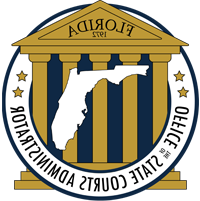Eighth Circuit Transforms Under-Utilized Law Library into Thriving Self-Help Center
Back in the day—before March 2020, when the pandemic began to surge in Florida and Chief Justice Canady authorized the discontinuation of all non-essential business travel—judges and court staff periodically ventured out of town for committee meetings or education programs. If the distance was great and the journey involved taking planes, travelers were often stuck in limbo, sometimes a quite long limbo, due to layovers or delays. This is precisely what happened to two Eighth Circuit travelers—Mr. Paul Silverman, the trial court administrator, and Ms Bridget Baker, the director of court operations—who were returning to Gainesville after a June 2016 National Association for Court Management conference in Louisville: their plane was delayed, and they had a lengthy wait ahead of them. Sometimes, these interims feel like a dreaded squandering of time. Other times, however, these forced pauses can be propitious—even astonishingly fruitful. And that was the case for Mr. Silverman and Ms Baker. As they sat in the airport, casually talking about work-related matters, lo and behold, they conceived an idea for metamorphosing their rarely used law library—a typically empty room—into a much-needed self-help center—now a bustling, vibrant, and useful space.
Every county in Florida used to have a law library, funded with a portion of court costs assessed in all criminal cases pursuant to Florida Statutes 939.185. However, across the nation, law libraries—which house legal materials and resources for conducting legal research—are closing due to diminished funding sources and dwindling use: these days, judges, attorneys, legal scholars, and others generally prefer to access digitized legal sources from their personal or work computers. And because law libraries typically do not offer assistance to self-represented litigants, they are not especially helpful to this demographic. To survive, law libraries have been reevaluating the best ways to serve their users and to make the smartest use of their space.
Before Ms Baker’s and Mr. Silverman’s airport epiphany, Alachua County had a law library with enough funding to pay for one county-funded staff position and for its collection of legal materials. The county also had a basic self-help program staffed by one county-funded employee, who did all the case management for the judges hearing pro se cases and handled the phone calls and emails pertaining to all the self-represented litigants in the county—a “huge job,” Ms Baker emphasized. Brainstorming with Mr. Silverman in the airport, Ms Baker wondered about the possibility of somehow marrying the two functions to create a center that would be practical, cost-effective, and in-demand.
They did the math: the law library was spending $20,000 annually on hard-copy legal materials that were rarely opened up. If they stopped these subscriptions, they could save money immediately. Before they could make any changes, however, they had to get the support of the library board of trustees. All agreed it was a radical change—but because Ms Baker had a thoughtful plan, they approved the idea. Ms Baker and Mr. Silverman also had to get buy-in from their county partners: the chief judge, clerk of court, state attorney, local bar association, and city commission. “It was not hard to persuade them,” Ms Baker said, “as they are all committed to helping Alachua County citizens.”
So the idea that was born in an airport in June 2016 became a reality by October 2016, when the self-help center opened for business. The center has three full-time staff: a director, Ms Annemarie Schuller (a county-funded position); a court specialist (a state-funded position), who provides support to the pro se judge (all family pro se cases are heard by a single judge in Alachua County); and an administrative assistant (this position is supported equally by law library and county funding). Funding is used primarily for salaries, but some is used for electronic research tools, specifically FastCase, which Ms Schuller described as relatively user friendly and a great tool for research.
Self-help center staff cannot give people legal advice, tell them what forms to fill out, represent them in court, or tell them how to present their case. However, staff can tell them where to get the packet of forms they need (either online or from the clerk of court’s office, which is conveniently located right downstairs); answer procedural questions; explain how to move the case forward; help the self-represented litigants set a hearing with the pro se judge; inform them about additional court requirements; and review their files before scheduling a court event to ensure the correct forms have been filed. “We can also do some hand-holding,” Ms Schuller added; “We can offer some comfort and help take some of the worry and stress out of the process.”
The self-help center is a highly efficient operation, Ms Baker remarked. Staff work closely with the pro se judge throughout the process, overseeing the case management details for all the family pro se cases; they set the docket, attend hearings, draft orders. “Our goal is to help people at the front end do things correctly, which streamlines the process, helps the self-represented litigants, and helps the judge,” Ms Schuller noted.
The top issue with which center staff are most frequently asked to help are family law matters using supreme court forms. Following that are county court-related matters such as landlord/tenant and small claims, and probate issues. Since the center opened, the number of in-person and phone call requests has nearly tripled—from 3,800 in 2017, to 7,100 in 2018, to 9,100 in 2019. On average, staff are helping between 30 and 40 self-represented litigants a day.
Self-help center staff have already helped the Twelfth Circuit reboot its law library, so the Eighth Circuit’s model is clearly replicable. When asked what advice they might give others looking to effect a similar transformation, Ms Baker explained, “Solutions often exist in resources you already have. For us, no additional funding was even needed—just a reallocation and a restructuring.”


